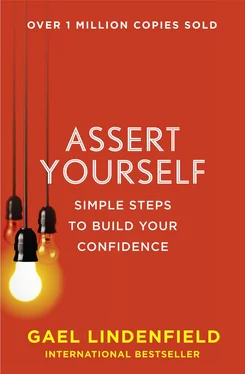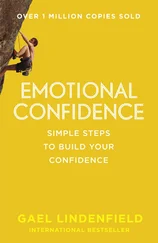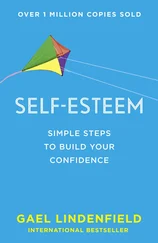
To my daughters, Susie and Laura, who have taught me so much about assertiveness.
Contents
Cover
Title Page
Be Assertive – Poster
Acknowledgements
Note to 2014 Edition
Introduction
Introduction to 2001 Edition
Part One: Ideas and Theory of Assertiveness Training
Chapter 1: Arguments for Assertiveness
Chapter 2: The Essence of Assertiveness
Chapter 3: Knowing Your Rights
Chapter 4: The Art of Being Positive
Chapter 5: Fundamental Assertive Skills
Chapter 6: Self-Protective Skills
Chapter 7: Getting Prepared
Part Two: Practical Work
Chapter 8: Practical Work on Chapter 1 – Arguments for Assertiveness
Chapter 9: Practical Work on Chapter 2 – The Essence of Assertiveness
Chapter 10: Practical Work on Chapter 3 – Knowing Your Rights
Chapter 11: Practical Work on Chapter 4 – The Art of Being Positive
Chapter 12: Practical Work on Chapter 5 – Fundamental Assertive Skills
Chapter 13: Practical Work on Chapter 6 – Self-Protective Skills
Chapter 14: Practical Work on Chapter 7 – Getting Prepared
Chapter 15: Some Suggestions for Further Study
By the same author
Other Titles in This Series
List of Searchable Terms
Copyright
About the Publisher
Most importantly, I would like to thank all the people who have attended my courses and given me such helpful and constructive feedback.
I would also like to thank Robert Adams for so willingly helping me to prepare the final text for publication.
Finally, I must thank my husband for his constant encouragement and challenge to my own assertiveness!
Although I wrote this book several years ago, it still offers a very good introduction to the subject, and the exercises will still work well for both individuals and self-help groups. The world, however, has changed quite dramatically since the book was written. The pace of life has become very much faster and more competitive for most people. As a consequence, personal stress has become a major mental and physical health issue. Assertiveness is a skill that we now need perhaps more than ever. When used in important situations – and in relationships that are diminishing or threatening our personal resources of time and emotional and physical energy – it is invaluable. For those of you who are still novices at using these techniques, you may be surprised to hear that I now would like to make a plea for the usefulness of passivity!
When I first wrote this book most people didn’t even know what the word ‘assertiveness’ meant. Now almost everyone does and assertive behaviour is generally expected of us all – not just at work, but also in our personal relationships. Over the last few years I have seen many people tire themselves needlessly by being too assertive all of the time! Once your self-esteem and self-confidence are in good shape, you might naturally find yourself letting many minor put-downs and unfair situations pass by without a challenge. But even if they are still shaky, remember that you can also decide to be passive from time to time, especially if you are tired or stressed. If you later decide that the issue is one that is important to you, you can always use your assertive skills to bring it up again. You will undoubtedly handle it better when you have had time to reflect and recoup your energy.
This book is based on an Assertiveness Training Programme which I used with a variety of groups over many years. It is, by no means, a definitive model either for myself or anyone else. It can and should be adapted, abridged, expanded – or indeed abandoned according to your own individual needs. In writing it, I have aimed to provide the following:
1. A Concise, Simple Account of the Theory and Principles
– as they are applicable to both men and women living within our Western culture.
Much of Assertiveness Training is concerned with changing or adapting our values, ideas and philosophy. Often we are unassertive merely because we think that it is wrong to be assertive. These thoughts may be quite deeply rooted in our minds as they are often placed there in early childhood and are embedded in the values of our culture. Our first task must, therefore, be to ‘reprogramme’ our minds by replacing the old unassertive values and thoughts with a more positive philosophy. From my own personal experience and the experience of people on my courses it seems that the repetition of appropriate quotations and proverbs is a useful way of effecting this change.
Throughout the book you will notice a number of these quotes and proverbs. They have been placed in boxes so that they can be easily identified and used as an occasional reminder of the philosophy of assertiveness. In my groups, I often write some out on large wall posters and suggest that this can be done at home or in the office as well.
I appreciate that some people might find them an irritating distraction from the text. If this should happen please ignore them and read on!
2. A Handbook for Self-Help Groups
Assertiveness Training is most often undertaken in a group situation. After all, old habits certainly do die hard but they do seem to vanish more quickly when we receive support and encouragement from others who can understand what the battle is all about.
Part Two of this book offers a programme of exercises which could be completed in approximately eight weekly sessions of two hours each. The appropriate theory can be introduced in the form of posters and handouts derived from the text in Part One.
By using the book in this way, the responsibility for leading the group could be shared by some or all of the participants.
3. A Handbook for Individuals
If for some reason you are unable, or unwilling, to join a self-help group, this basic programme can be adapted for use on your own at home.
At the end of each practical exercise I have made some suggestions about how you could achieve this. I suggest, as with self-help groups, you could work on one short session each week over a period of two months. It is important to cover the basic ground very thoroughly and not to try too much too quickly. You may need more self-discipline and motivation to work in this way, but it should still be possible to make some effective progress.
Introduction to 2001 Edition
What a strange and moving experience it was for me to revisit this book! It brought back so many wonderful memories of the excitement we felt when doing this ‘groundbreaking work’ over 25 years ago. It is hard to believe how few people at that time had even heard the word ‘Assertiveness’. Now it is part of our everyday language. A whole generation has grown up taking it for granted that they ought to be more assertive – and, feeling full of guilt because they are not!
It is of course one thing knowing how we would like to behave, and quite another trying to stop ourselves from acting too often like a doormat or a raging bull. I know, because it was the position I had been in for many, many years before I came across Assertiveness Training. Its simple easy-to-learn techniques changed my life. That is why I became so committed to doing this work and spreading the word. Interestingly, many of the participants on our early courses and readers of this book have done just the same. I have had many letters and calls from people who wanted to let me know that they had been inspired to start training groups in their schools, offices, hospitals, churches and community centres. This was wondrous music to my ears, which had previously been filled with the whispering of cynics who said our work would breed selfishness and ego-centredness.
Читать дальше













